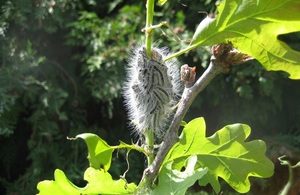World’s first International Plant Health Conference to set global agenda on biosecurity and address challenges in plant health
Policymakers, academics and experts from over 74 countries will come together to address current and future plant health challenges.

Caterpillars of the tree pest Oak Processionary Moth. (Credit: Forestry Commission)
The world’s leading authorities on plant health and biosecurity will come together for the world’s first ever International Plant Health Conference (IPHC), co-organised by the Food and Agriculture Organization (FAO) of the United Nations, the Secretariat of the International Plant Protection Convention (IPPC) and Defra.
More than 500 policymakers, academics and experts from over 74 countries will convene at the Queen Elizabeth II Conference Centre in London to address current and future plant health challenges, including the impacts of climate change, food security, environmental protection, facilitating safe trade, and new pest and disease pathways, such as e-commerce. Held on 21-23 September, delegates will share knowledge and discuss global scientific, technical and regulatory issues, alongside actions to tackle these existential threats to our society, economy and environment.
The Food and Agriculture Organization (FAO) of the United Nations estimates that each year up to 40 percent of global crop production is lost to plant diseases, costing the agricultural trade over USD 220 billion, whilst invasive insects cause losses of at least USD 70 billion. The risks to food security, international trade, biodiversity and our precious natural environment as a result of current and future outbreaks are all too real. Strengthening global standards of biosecurity, applying the IPPC and international plant health standards, as well as fostering greater international collaboration and raising public awareness and engagement with these challenges will be paramount to safeguard the global economy and environment for generations to come.
Nicola Spence, United Kingdom Chief Plant Health Officer, said:
Plant health and biosecurity are fundamental to life on Earth. Plants provide 80 percent of the food we eat and 98 percent of the oxygen we breathe. In a changing climate, ensuring their continued health and vitality will be critical to safeguarding food security, safe international trade and a thriving natural environment for future generations.
The United Kingdom upholds amongst the highest standards of biosecurity in Europe but there is much more to do to secure our future resilience - here and around the world. I look forward to coming together with international experts from a range of disciplines to discuss how to tackle the varied and mounting challenges facing our precious plant life.
Jingyuan Xia, Director of Plant Production and Protection Division said:
Climate change and human actions have altered ecosystems and created new niches where plant pests and diseases can thrive. When combatting pests and diseases, farmers should adopt, and policymakers should encourage the use of, environment-friendly methods such as integrated pest management.
Applying international plant health standards helps reduce the use of pesticides and poisonous substances, which kill pollinators, natural pest enemies and organisms crucial for a healthy environment. These result in healthier crops with less residues, leading to better human, plant and animal health.’’
Osama El-Lissy, Secretary, International Plant Protection Convention, said:
The first International Plant Health Conference is an important advancement of our work in protecting plants from pests and diseases. We are very pleased to partner with Defra who shares FAO’s and IPPC’s common goals. We cannot underestimate the impact that plant pests and diseases have on global food security, livelihoods, the environment and economies.
To achieve our goals and contribute to food security, protect the environment and facilitate safe trade, I encourage donors and governments to invest in building plant health capacity, research and outreach. Let us keep our collective efforts going and take bold action to sustain the momentum. When we protect plants, we protect our health and our lives.
Across the three days of the IPHC, plenary sessions will explore a range of scientific, regulatory and technical issues, including:
- Regional perspectives on tackling ongoing pest and disease outbreaks, including Xylella fastidiosa, fall armyworm and coconut rhinoceros beetle.
- How to increase the use of electronic phytosanitary certificates to make trade safer, faster and cheaper.
- The development and adoption of early warning systems for pests and diseases to increase vigilance and preparedness for future outbreaks.
Moreover, the IPHC aims to promote positive behavioural change through greater public engagement with biosecurity issues. For example, the importance of not bringing home plants, trees, fruit and seeds from overseas, as doing so could inadvertently cause pests, diseases and invasive species to be introduced or to spread in new areas. This aligns with the United Kingdom Government’s long-running ‘Don’t Risk It!’ campaign, which featured on the Animal and Plant Health Agency’s Gold Medal-winning stand at the RHS Chelsea Flower Show 2022.
Protecting plant health is critical in achieving the United Nations Sustainable Development Goals (SDGs). Healthy plants contribute to achieving food security for all (SDG 2 Zero Hunger) and promotes responsible food consumption and production (SDG 12). Protecting plants helps protect biodiversity and the environment from the impact of plant pests (SDG 13 and 15), and facilitates safe trade, in turn providing decent work and boosting economic growth (SDG 8). The International Plant Health Conference supports the delivery of the IPPC Strategic Framework 2020-2030.
For more information, visit the International Plant Health Conference website.